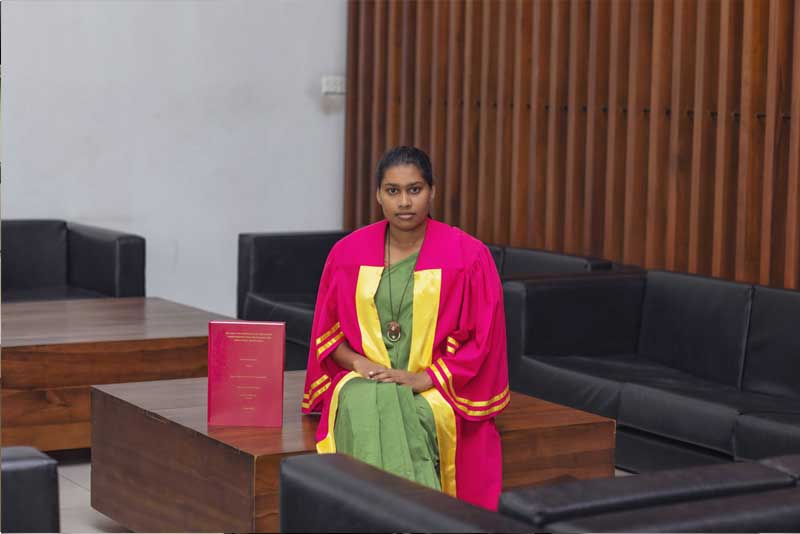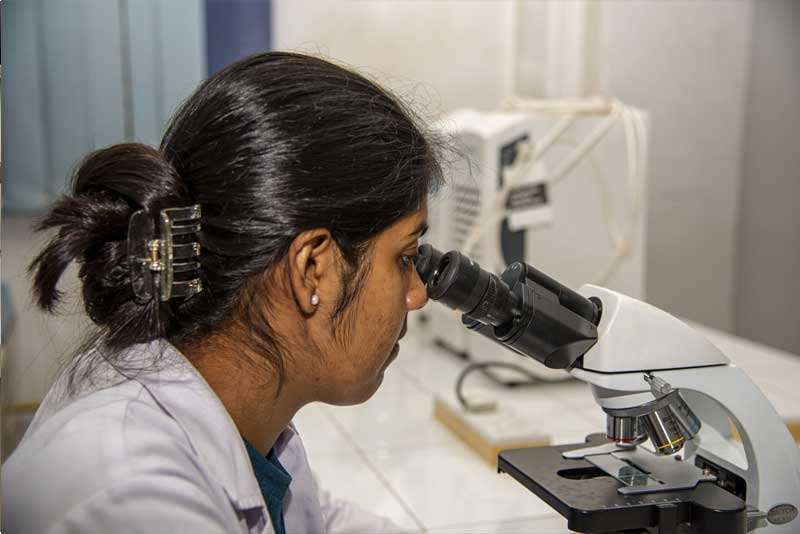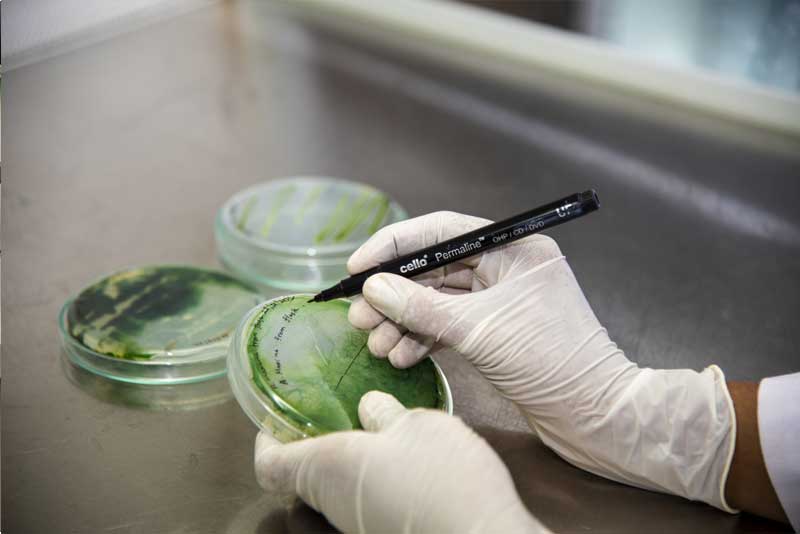Doctor of Philosophy
- Type: Research
- Field: Architecture, Business, Engineering, Information Technology, Medicine
- Qualification Level: 12 SLQF
- Length: 3 Years (Full-Time)
4 Years (Part-Time)
The Doctor of Philosophy is an opportunity to students to pursue a topic you're passionate about at the highest academic level. As with two other research degree programs, Ph.D. is an independent, supervised research project that is assessed on the submission of a thesis.
About Doctor of Philosophy
-
01. Eligibility Criteria
- An Honours Bachelor’s degree of the University of Moratuwa, of merit not less than Second Class Honours (Upper Division) in a relevant field.
- Any other Honours Bachelor’s degree from a recognized University, in a relevant field, equivalent to an Honours Bachelor’s degree of the University of Moratuwa, and of merit not less than Second Class Honours (Upper Division).
- A Master of Philosophy degree from the University of Moratuwa in a relevant field.
- A Master of Philosophy degree from a recognized University, in a relevant field, equivalent to a Master of Philosophy Degree of the University of Moratuwa.
- A Master’s degree from the University of Moratuwa in a relevant field and an Honours Bachelor’s degree from a recognized University in a relevant field, equivalent to an Honours Bachelor’s degree of the University of Moratuwa, and of merit not less than Second Class (Lower Division).
- Any Postgraduate degree with a component of research, evaluated by a thesis or dissertation, from a recognized University in a relevant field.
and
either
(a) an Honours Bachelor's degree from a recognized University in a relevant field of merit not less than Second Class (Lower Division)
or
i. any other Bachelor’s degree from a recognized University in a relevant field, and of merit not less than Second Class (Lower Division)
and
ii. a minimum period of one (01) year post qualifying experience after the bachelor's degree
- Has been successful in a transfer evaluation as set out in the relevant by-law for the Ph.D.
-
02. Online Application
If you have chosen the following, you may go on to complete the online application.
- a potential supervisor
- have the proposal ready
- have identified the course modules for your program
Following supporting documents will be required:
- A scanned, passport-sized, colour photograph (3.5 X 4.5 CM, 300 dpi)
- Scanned academic transcript(s)
- Scanned certificates of any professional qualifications that you have indicated in your application
- Letter of leave from your employer (if applicable)
- Any other documents in support of your application
You may save and exit the application process at any time. If you do so, you will be assigned an Application Reference Number, which you can use to recommence your application at a later time. Further detailed guidelines on filling the application are available on the form itself.
You will be allowed to submit an application only once. In order to make sure your application process is error-free, you can download unfilled application forms for MSc (Major Component of Research) and confirm in advance, the information to be entered.
After submitting your completed application, you will be given further instructions on submitting it to your supervisor along with certified copies of supporting documents.
Applications may be submitted at any time.
Referees:
You will also need the names, designations, email addresses, and contact numbers of three non-related referees. Please note that you should not designate any of your supervisors as referees. When you submit your application, an email will be sent to the three referees to complete an online report.
-
03. Admission and Registration
Once your application is accepted by the University, you will be informed by the Faculty of Graduate Studies (FGS) to register for your program.
This is completed when Senate approval is granted for the applicant, and the relevant fee has been paid in full
- Registration is completed by submitting the Formal registration and along with the indicated supporting documents.
- Upon registration, you will receive the following from the FGS:
- a registration number
- your personal calendar with the key milestones
- your University LMS (Learning Management System) account
** All successful applicants must complete formal registration within 6 months of the Date of Commencement or the date of Senate approval, whichever comes first. If the applicant fails to do so, their offer of admission will lapse.
-
04. Proposal Review
The Proposal Review for PhD candidates is held within 4 – 8 months of the Date of Commencement and will take the place of the first progress review.
The objectives of this is to assess the candidate’s approach to problem definition, the scope of the planned research, background review carried out, preparation for research, and the availability of resources. These are evaluated through a detailed research proposal submitted by the Candidate, a presentation, and a viva.
Procedure for the Proposal Review.
Step 01:The candidate will make an application for the Proposal Review examination at least 1 month in advance of the expected date to the Research Coordinator via the Principal Supervisor (Application for Proposal Reviews by Candidate). The candidate shall submit a detailed research proposal (softcopy) with the application to the Research Coordinator via the Supervisor. (2_3_6 proposal template)
Step 02:The Principal Supervisor is responsible for scheduling the Proposal Review. The research proposal will be uploaded given DMS folder and shared to the members of the Proposal Review panel by the Principal Supervisor in advance of the review. The principal supervisor does not need to request links for each Progress review. One link for all communications from the FGS will be provided till the thesis submission to the research students upon the first-time request of the supervisor. The student can create respective folders for a particular review meeting.
Step 03:The candidate will make a 20 to 30-minute presentation of the proposal.
Step 04:The candidate will face the viva-voce examination.
Step 05:The panel will prepare the report and hand it over to the Research Coordinator (Report of the Proposal Review Panel).
Step 06:The result and the report of the PR will be forwarded to the BoGS via the Board of Studies for Research Degrees by the Research Coordinator.
Step 07:The FGS will convey the results and the detailed comments of the panel in writing to the candidate and the supervisor.
Step 08:The LMS will be updated by the FGS with the result following acceptance by the BoGS.
- Guidelines for conducting the Proposal Review online are available at: Click Here
- If the review result is unsatisfactory, the candidate may be given a second chance before the end of 12 months.
- If the proposal review is not held or is not satisfactory (even after one re-evaluation) by the end of 12 months, the candidate may be discontinued by the University.
Proposal Review Panel Composition
The Proposal Review panel will consist of the Progress Review panel plus one additional member representing the relevant Board of Studies for Research Degrees.i.e., the Proposal Review Panel will be composed of:
(a) A specialist in the field of study, potentially from an industry, another university, or another department, who will act as the Chairperson. In adopting this approach ease of planning a review as well as availability for the research period should be kept in mind. In the case of multidisciplinary research, two specialists from the relevant areas can be nominated.
(b) One supervisor. In the case of multidisciplinary research, two supervisors from relevant areas can be nominated.
(c) An internal member of the relevant department.
(d) A member of the BoS-RD from outside the Department. The role of this member shall be to provide an objective view of the proposed research in order to ensure that it is in accordance with the expected academic and ethical standards of the University, and has appropriate supervision, particularly if it is of a multidisciplinary nature, or if the subject matter overlaps the domain of another Department. He/she will have the authority to adviseon necessary action to be taken to over come any issues that may be present.
Members (a),(b) and (c) will continue to be the corresponding members of the candidate's Progress Review panel as well (see composition of the Progress Review panel).
The number of non-supervisors in the panel shall be at least one more than the number of Supervisors. A Supervisor shall not be appointed as the Chairperson.
Panel Appointment
Thepanel members (a)-(c) will be proposed by the Principal Supervisor in the candidate's application for admission, nominated by the Head of Department and recommended by the relevant Board of Studies for Research Degrees and appointed by the BoGS (asapproved by the Senate at its 428th Meeting). Panel member (d) will be proposed by the BoS-Research in the application for admission and will be appointed by the BoGS according to the same processas for (a)-(c).
The qualifications (in case of external or non-permanent members of the staff of the University) and the designations of all members of the panel should be submitted along with their nomination.
-
05. Progress Reviews
The objectives of this is to review the progress of the candidate towards achieving his/her research objectives during the period under consideration and provide guidance and constructive feedback to resolve any issues that may be present.
Progress reviews are to be held every 6 months for PhD candidates. In the case of PhD candidates, the Proposal Review will take the place of the first progress review.
The minimum number of progress reviews (including the Proposal Review where applicable) to be held for graduation is given below.
- Full-Time: Minimum 05
- Part-Time: Minimum 07
The following exemptions can be given for progress reviews of PhD candidates only in exceptional circumstances.
• The candidate can submit at least one research paper published/accepted in Q1, Q2 or Web of Science core collection journal or top 20 Google Scholar matrix conference in lieu of a progress review to meet the minimum number of progress reviews only once in the candidacy period. Self Reporting Form
Procedure:
Step 01: The candidate will make an application to hold the progress review examination approximately 1 month in advance of the expected date to the Research Coordinator via the Principal Supervisor. (Application for Progress Reviews by Candidate). The candidate will show evidence of publications, participation in research seminars/workshops as required, draft chapters of the thesis (softcopy) and the progress in completing coursework where relevant
Step 02: The principal Supervisor is responsible for scheduling the Progress Review.
Step 03: The principal supervisor does not need to request links for each Progress review. One link for all communications from the FGS will be provided till the thesis submission to the research students upon the first-time request of the supervisor. The student can create respective folders for a particular review meeting.
Step 04: The candidate will make a 20 to 30 minute presentation.
Step 05: The panel will orally examine the candidate.
Step 06: The panel will prepare the report and hand it over to the Research Coordinator. (Report of the Progress Review Panel)
Step 07: The result and the report of the Progress Review will be forwarded to the BoGS via the Board of Studies for Research Degrees by the Research Coordinator.
Step 08: FGS will convey the results and the detailed comments of the panel in writing to the candidate and the supervisor.
Step 09: The LMS will be updated by the FGS with the result following acceptance by the BoGS.
If two consecutive progress reviews are not held within the scheduled period or if both are deemed to be unsatisfactory by the panel, the candidate may be discontinued by the University.
The panel will be composed of:
(a) A specialist in the field of study, potentially from an industry, another university, or another department, who will act as the Chairperson. In adopting this approach ease of planning a review as well as availability for the research period should be kept in mind. In the case of multidisciplinary research, two specialists from the relevant areas can be nominated.
(b) One supervisor. In the case of multidisciplinary research, two supervisors from relevant areas can be nominated.
(c) An internal member of the relevant department.
- The Principal Supervisor will convene the review meeting. The progress review panel should submit the results of the review to the Board of Graduate Studies (BoGS) via the Board of Studies (BoS) of the faculty.
- The number of non-supervisors in the panel shall be at least one more than the number of Supervisors. A Supervisor shall not be appointed as the Chairperson.
- The members of the Final Examination Panel and the Proposal/Progress Review Panel shall not be identical.
Progress Review Panel Appointment:
The panel members will be proposed by the Principal Supervisor in the candidate's application for admission, nominated by the Head of Department and recommended by the relevant Board of Studies for Research Degrees and appointed by the BoGS (as approved by the Senate at its 428th Meeting). The qualifications (in case of external or non-permanent members of the staff of the University) and the designations of all members of the panel should be submitted along with their nomination.
Discontinuation due to Failure to Achieve Milestones
If in the judgment of the University, the performance of a candidate is consistently unsatisfactory over a period of twelve months, the candidate's registration may be cancelled by the Senate on the recommendation of the Head of the Department, the Board of Studies for Research Degrees and the Board of Graduate Studies. The Research Coordinator of the relevant Department shall initiate the discontinuation procedure with the consent of the Principal Supervisor.
Guideline for conducting Progress review online Click Here
-
06. Examination Panel Appointment
You can view Examination Panel Appointment details through the below link.
Examination Panel Appointment Details -
07. Publication Requirement
The candidate must satisfy the following publication requirements for graduation. These must be met at the time of the initial submission of the thesis.
- Two refereed publications, with at least one published/ accepted for publication in an indexed journal.
What are Indexed publications?
Full-length articles (not abstracts) in journals and conferences which are listed in one of the following indices:
- Thompson Reuters Web of Science Core Collection (SCI-Expanded, Social Science Index, Arts, and Humanities Index, Emerging sources citation index) or
- Scopus
What are other refereed publications?
These are full length articles published in a recognized journal conference not in any of the indexes above. The article should be submitted with the decision of the Editorial Board and the referee reports. Care should be exercised to avoid predatory journals. The journal or conference must be recommended by the Progress Review Panel, and must be acceptable to the Panel of Examiners.
How is “Acceptance of an article” defined?
The article submitted for the fulfilment of the higher degree should meet one of the following conditions to be considered as published:
- Already published
- Editorial panel has accepted the paper
- Reviewers have accepted the paper with minor revisions
-
08. Initial Thesis Submission and Viva - Voce Examination
Step 01:The supervisor should obtain a DMS link to submit documents from the FGS via dms-fgs@uom.lk.
**Note that a link needs to be obtained for each candidate separately.Step 02:The candidate should upload using the upload link given at the top of this message.
Documents Required:
- Draft Thesis
- Turnitin Full Report
- Summary of Turnitin Report
- Justification for Higher Similarity Index
- Publications
**All documents should be in .pdf format. Please do not submit documents in any other format, including zipped files.
Step 03:Then students have to log in to their LMS account and submit the initial thesis submission form.
Step 04:The initial thesis submission form will be forwarded via system-generated email from UoM FGS Office to the Supervisor, Research Coordinator, HoD, and Chairman/Director,PGS to reach the FGS.
Step 05:FGS will make the documents submitted by the candidate available to the Panel of Examiners. Initial Submission Via LMS.
Guideline for initial thesis submission form via Click Here
-
09. Final Thesis Submission
Step 01:The supervisor should obtain a DMS link to submit documents from the FGS via dms-fgs@uom.lk.
**Note that a link needs to be obtained for each candidate separately.Step 02:The candidate should upload using the upload link given at the top of this message.
Documents Required:
- Final Thesis
- Abstract
- Turnitin Full Report
- Summary of Turnitin Report
- Justification for Higher Similarity Score (if applicable)
- Publications
- Balance Due Payment Slip
- Permission to Open Access to Thesis - Click Here
**All documents should be in .pdf format. Please do not submit documents in any other format, including zipped files.
- Submit Clearance Form via your LMS Account - Click Here
Step 03:Then candidates have to log in to their LMS account and should submit the Final Thesis Submission Form.
Step 04:The final thesis submission form will be forwarded through Supervisor, Research Coordinator, HoD, and Chairman/Director,PGS to reach the FGS.
-
10. Re-Examination
In this case, the Candidate is required to face a re-examination. The Candidate shall submit the thesis for re-examination as per the time frame specified by the Panel of Examiners at the initial viva-voce examination. Re-examination can take one of two forms, as recommended by the final evaluation panel:
- Re-examination of the thesis only.
- Re-examination of the thesis and repeat viva-voce examination after major corrections/modifications are done.
The re-evaluation process is described below. Detailed requirements in each step are further explained in the relevant forms used at each stage.
Step 01: The Candidate shall complete the Form for Submission of Thesis for Re-examination (yellow form, form 4_5_2_1) and submit it with an examinable copy of the revised thesis and supporting documents to the FGS through the Supervisor, Research Coordinator, HoD and D/PGS.
Step 02: A tuition fee will be charged from the date of the initial viva-voce examination to the date of submission of the revised thesis, on a pro-rated basis.
Step 03: A re-examination fee will be charged.
Step 04: The normal time allowed for an Examiner for submitting the report on the revised report shall be 2 weeks.
Step 05: If the previous recommendation of the Panel of Examiners was to re-examine the thesis only, the result will be based on the reports of the Examiners on the revised thesis.
Step 06: If the previous recommendation of the Panel of Examiners was to re-examine the thesis and repeat the viva-voce, a repeat viva-voce will be conducted.
Step 07: The final result of the re-examination process shall be one of the following:
- Award the Degree
- Award the Degree after minor corrections indicated are done to the satisfaction of the Supervisor normally within one month.
- Award of the Degree is not recommended.
- Other (e.g. a downward transfer)
Step 08:Candidate submits the final thesis with the required supporting documents.
Study Period of Candidates Who Face Re-Examination:
The candidacy duration (study period) for Candidates who undergo a re-examination process is extended up to the time the thesis is submitted for re-examination.
-
11. Award of the degree
The candidate shall satisfy the following requirements, and any other requirements as per the relevant By-Law, to be considered to be eligible for the award:
- Has pursued an approved program
- Has fulfilled all academic requirements of the program
- Has successfully completed all prescribed evaluations
- Has successfully met the stipulated publication requirements
- Has fulfilled both minimum and maximum duration requirements
- Has paid all fees
The final authority to determine the award of the degree is the Council of the University. This approval takes place upon the recommendation of the Faculty of Graduate Studies and the Senate.
A Candidate for a degree, once determined as successful by the Senate, shall be considered as a Graduand until the award of the degree at a Convocation.
A Graduand shall supplicate to obtain the degree at the Convocation either in person or in absentia, as per the relevant by-law.



